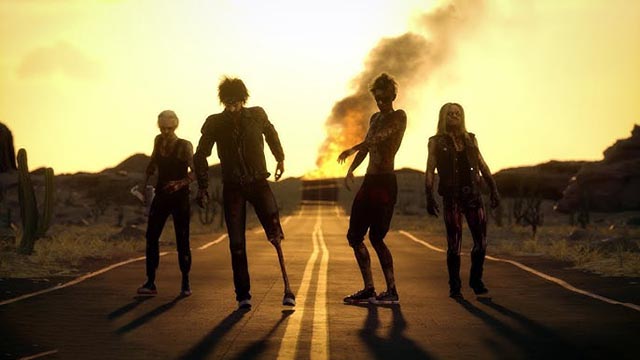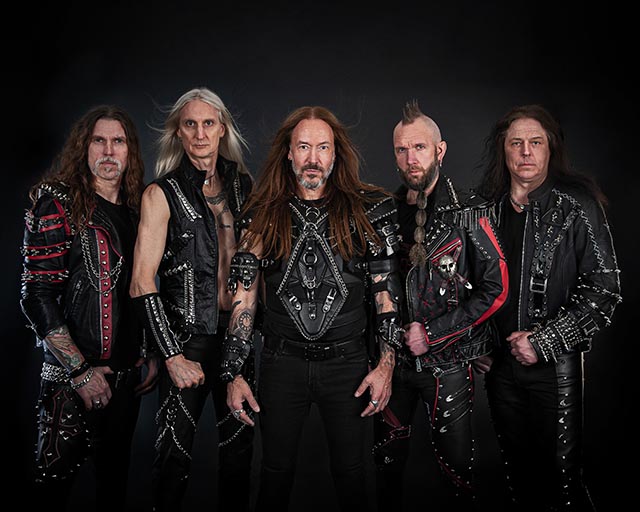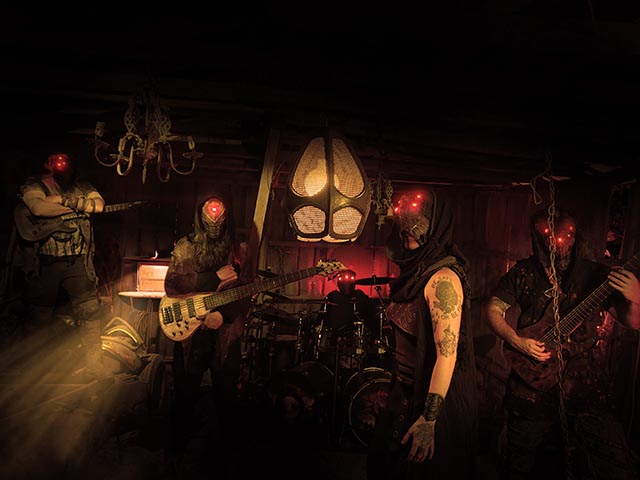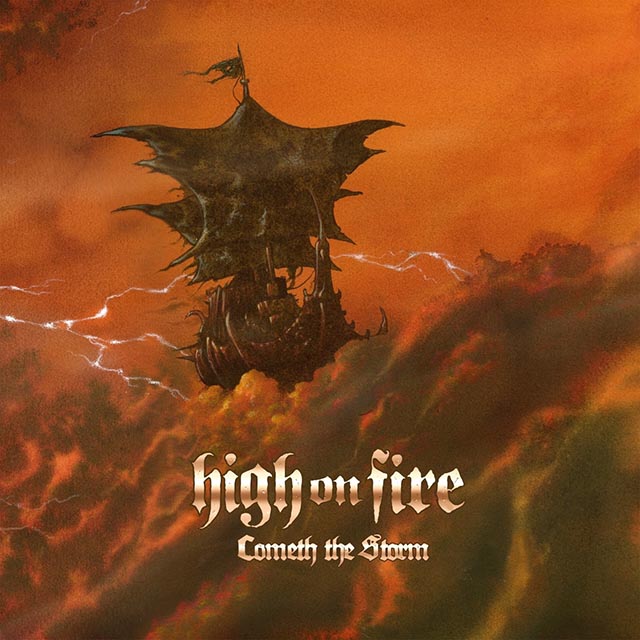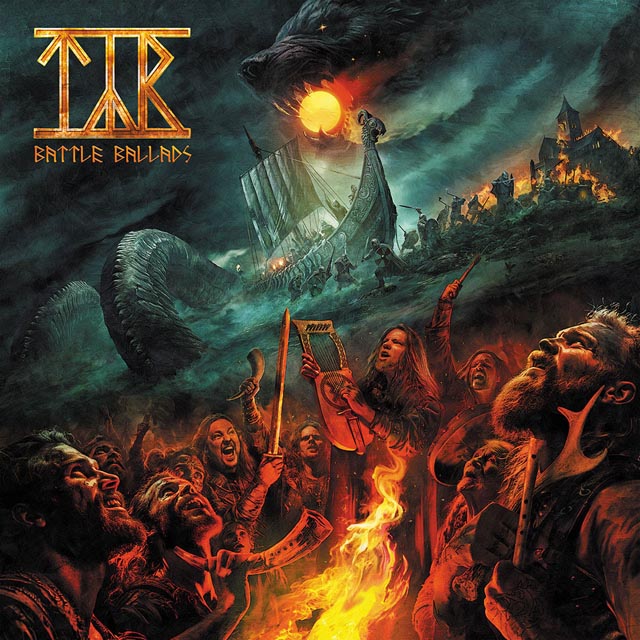 Metal madman Devin Townsend, known for his work in numerous solo projects as well as Strapping Young Lad, is releasing Ki, the first in a four-part series of albums under the moniker the Devin Townsend Project this week. He’s also known for his stellar production work on a wide variety of bands, from Bleeding Through to Darkest Hour to Misery Signals. Devin talked to Metal Insider about the new album, his views on the role of a producer and why it can be so draining.
Metal madman Devin Townsend, known for his work in numerous solo projects as well as Strapping Young Lad, is releasing Ki, the first in a four-part series of albums under the moniker the Devin Townsend Project this week. He’s also known for his stellar production work on a wide variety of bands, from Bleeding Through to Darkest Hour to Misery Signals. Devin talked to Metal Insider about the new album, his views on the role of a producer and why it can be so draining.
Where did this 4-album series concept come from?
Just to clarify, it’s not really a concept [series of albums], it just kind of mirrors the progression that my own world’s been through over the past couple years. And even that’s nothing really profound, it’s just the way I tend to write music, it just kind of illustrates whatever has been going on. In that way, I’m sure it’s like a loose concept, but it’s not like The Wall or Operation Mindcrime or anything. There’s no characters, it’s just the progression my life’s taken over the past three years with a lot of personal change. Just seems that the music came all during that time, and as a result it’s kind of like a soundtrack to [it]. But there’s no message, there’s no mission. I’m not trying to beat any profound or otherwise statement into anyone’s head.
This is called the Devin Townsend Project as opposed to the existing Devin Townsend Band, what’s the difference?
The Devin Townsend Band was based on a real heightened sense of me talking about personal life and things that perhaps had a sense of self-importance attached to it that wasn’t necessarily exciting for an audience to participate in. It’s like the “me” show, live. I think with the Devin Townsend Project, I tend to group certain sounds and certain eras of my music development into certain places, and Devin Townsend Project is the name I gave to all four of these records which seem to be connected in terms of where, how and under what circumstances they were written. I’m going to be writing, regardless of whether or not it has a name, a record deal, whether or not people hear it or even want not hear it. So DTP for these four records seemed to be, granted an uncreative solution, but a solution to the name of the four records.
So is this something that you see sort of finishing with these four records and then you’re going to move on to whatever the next thing is?
Yes, absolutely. The next one could be the Devin Townsend Experience or whatever. Again it’s not a very creative solution, we could have called it Tri-Tiperon from the Third Dimension Project Perfunkatron. But it’s like the Devon Townsend Project, there ya go. And after this is over who knows what will happen.
How fleshed out or deep into the recording are you with the other three albums?
I am currently editing guitar and bass to the drums of the second record, so maybe about one quarter to one half of the way through the second record. But all the music pretty much has been written for some time, so it actually makes the process kind of interesting for me, because it’s almost like producing a band now. It’s not like I have to be so emotionally attached, because a lot of that emotion that went into the creation of it was about a year ago, so now it’s just like: “Okay, take a deep breath, this one has to be like this.” The demos are all in ProTools, so it’s just basically fleshing out the demos so I don’t really have to involve myself as an artist or a musician, it’s more like producing.
Is that the mindset that you get in when you produce your own stuff? What is finished is finished, and now I’m going to only wear the producer hat?
That’s the best way to keep objective about it, because when you’re too close to it, you just end up second-guessing it. You get insecure. I’ve had the past 3 years to hone production skills to the point where I’m competent, so when I do this stuff, it’s like I haven’t actually even heard this music for a month. I’ve just been editing it, and ultimately when it all comes together, it’s a tried and true thing for me, creatively. I enjoy producing, actually, and I actually really enjoy producing my own music, because at the end of it it’s something I can truly get behind. I’ve produced a lot of bands, and not that I don’t like the bands, but 99.999%… I’d never write anything like that. At the end of it I’m like, “Okay, I’m satisfied with this.” Will I listen to this again? Maybe once in a while, but it’s not gonna be something that’s really gonna affect me as much, so doing [my own music] fun.
You’ve produced such a wide variety of bands. Some, like Becoming the Archetype, seem like you’d be a dream producer for, but a band like Misery Signals or Bleeding Through isn’t necessarily so obvious. How do you find such a diverse range of bands to work with?
The funny thing is, I don’t. Either they come to me, or the management provides it for me. And in all honesty, all the production I’ve done up to this point is really just to hone my skills to be able to do my own [music] more efficiently. A band like Becoming The Archetype, it’s a good band, but also it’s a scene that I wasn’t involved with. The Christian metal thing was interesting for me to get in there and figure out what they’re doing. The same with Bleeding Through. It’s a scene that I had nothing to do with, so just hanging out with those guys and hearing their casual conversations, even on a personal level, is interesting just to kind of hear and be like, “Wow, I had no idea this scene was based around this.”
I’ve worked with so many bands over the past couple of years, and it kind of burnt me out on a personal level because the inter-band politics is draining for me. After being in a band for 15 years, it goes without saying that [I know] there’s going to be politics, but when they’re not your issues, you end up being a mediator in a lot of ways. A lot of times to get the record sounding like a band, like a group of dudes that are on the same page, you have to play that role.
So you’re more of a hands-on producer, you’re not like Rick Rubin type that will walk away during recording and come back to evaluate after.
I wish I was, then I could just make money and go work in the shed in my spare time. But it’s not the way I operate. What I thought was gonna be a 9 to 5 job ended up being a I get there at 10 [AM], and band would wake up at 1, and we’d start at 2. Then someone would fight, then we’d be there solving problems and then we’d start editing. Then someone wouldn’t like a riff, and then we’d talk about that, and then by about 2 in the morning, I’d go home.
And I think it’s what made my productions interesting at least, but it’s also what ultimately drove me away from it. I commit myself to whatever I do, and if it’s other people’s problems, then I commit myself to that too, and it’s just not a way for me to exist. I think that ultimately a producer who’s more seasoned than me and a better producer than me would just be like, “You, shut up. You, play your part. You, get on with it. We’ve got six more hours here and if we talk about this we’re not gonna have time to do it. Lunch, let’s go, one hour,” and task-master it. But because I was in a band for so long, I sympathize with a lot of the shit that goes on. So I just end up delving into it like one of the band members, and by the end of it I’m like, “It’s not even my band!” and I just find it really taxing.
However, not every band is like that. There were some bands that were prepared, did a good job and the record turned out well. Ultimately, I found a satisfaction from helping other people achieve that goal. That was liberating in a lot of ways, because I could just let it go at the end. And they’re going, “we’re having problems getting signed,” or “our tour’s falling through.” I’m thinking, “Well, I’m doing something else now, let me know if there’s something else I can do to help you on this front, [but] my job is done.”
There were some bands that were so hard to work with, but you can’t really hear that on the record. But the thing I take away from production is that feeling of, “Wow that was rough.” It’s not “we made a great record,” it’s, “it was rough and it’s not my favorite style of music to begin with, so I don’t know if I’ll be listening to it.” What I learned from it was now I’m doing my own music, and I learned a ton of shit from these bands. So it’s been great.
The thing is, almost all the bands I produced were $15,000 to $20,000 budgets. It’s not like I ever got a band that had $100k budget. I think in order to make a good record, you have to play the mediator like I did. You have to be sympathetic, you have to help them, you have to get in there and be one of the crew. But ultimately, because of my dedication, I often work for 6 weeks and come out of it with maybe two grand in the pocket – and for 6 weeks worth of work, it’s just not worth it. If, however, an awesome band came to me and said, “Hey we want what you do, and we’re willing to pay you a regular wage for it,” then I’d take it. Because in all honesty, I’m good at it, but I think by the end of it, my process is just so intensive that coming up at the end of it after 6 weeks with basically no money and a family just ended up starting to make me a little hesitant to do it.
What circumstances or band would be a production project that you would jump at now?
I could see maybe doing a Slayer record, I could enjoy getting behind that. To be clear, I was never a huge Slayer fan. But I think the thing with metal that I really appreciate the fact that they are still doing it from the heart. I think when music, specifically heavy music, the motivation for it is other than truly feeling it, that’s when it becomes really difficult for me. When people are saying, “We have to do it this way, because this is what’s popular,” it becomes difficult.
Andy Sneap, for example, has got a great sound, but that’s Andy Sneap’s sound. It seems like there’s a lot of folks that say, “We want our record to sound like Andy Sneap.” And I’m like, “well why don’t you go to him?” They can’t afford him. Okay, well, I can give you a half-ass version of what Andy Sneap does. And it will never sound the same, and in fact on a couple records, that’s what I’ve done – but it just sounds like a more compressed, shittier version of Andy Sneap. But if I just do what I do, which is a different sound altogether, then we’re good to go.
The identity of each band is what’s important for me, production-wise. I think this is why a lot of bands that come to me end up being such an ordeal, when we’re working and I’m like, “What is it you guys truly are? What’s you’re angle? If this is your lyrical point of view, are you sure you wanna say this? Are you sure you wanna say that? Are you sure you wanna do this?” Then sometimes when you get into it, you realize that maybe: #1, they’re not sure or #2, their motive for doing it is something that you either don’t agree with or you wonder if they even understand.
I honestly haven’t figured out if I really want to be a producer, and probably if I really felt like I did, I wouldn’t even be talking about shit like this. But I kind of fell into this producing thing, and then realized at the end that it’s like a lot more of a kind of therapy to make a good record with a metal band.

